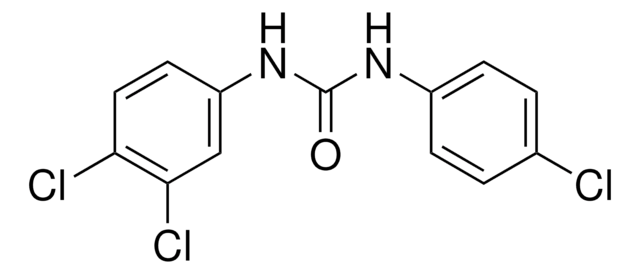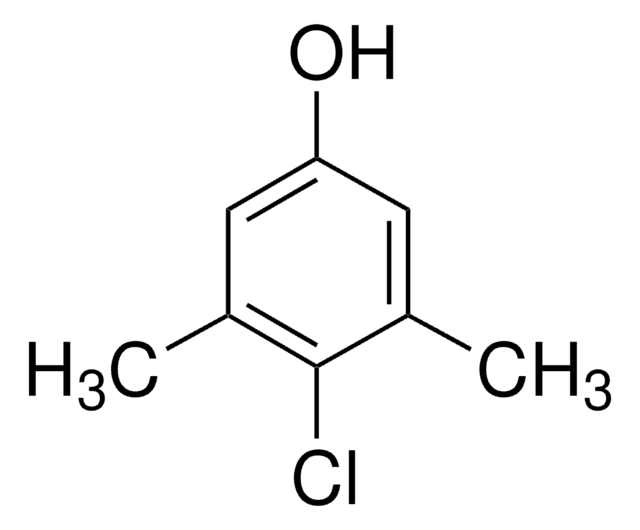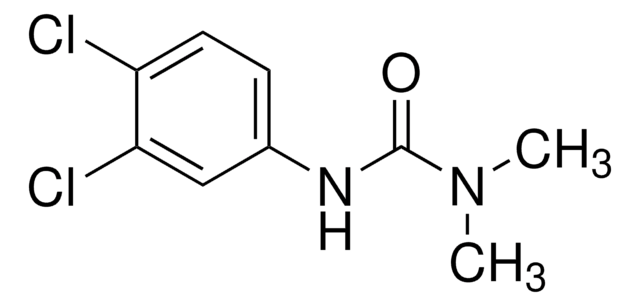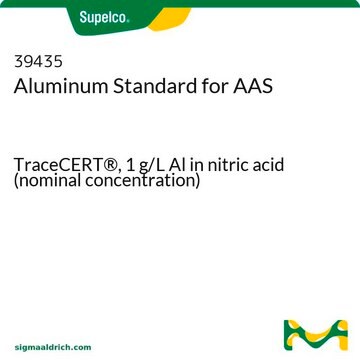Fontos dokumentumok
105937
3,4,4′-Trichlorocarbanilide
99%
Szinonimák:
1-(4-Chlorophenyl)-3-(3,4-dichlorophenyl)urea, TCC, Triclocarban
About This Item
Javasolt termékek
Ügynökség
EPA 1694
Minőségi szint
gőznyomás
<0.1 mmHg ( 25 °C)
Teszt
99%
Forma
solid
mp
254-256 °C (lit.)
oldhatóság
methanol: soluble
alkalmazás(ok)
environmental
funkcionális csoport
amine
chloro
SMILES string
Clc1ccc(NC(=O)Nc2ccc(Cl)c(Cl)c2)cc1
InChI
1S/C13H9Cl3N2O/c14-8-1-3-9(4-2-8)17-13(19)18-10-5-6-11(15)12(16)7-10/h1-7H,(H2,17,18,19)
Nemzetközi kémiai azonosító kulcs
ICUTUKXCWQYESQ-UHFFFAOYSA-N
Géninformáció
human ... EPHX2(2053)
mouse ... Ephx2(13850)
Looking for similar products? Látogasson el ide Útmutató a termékösszehasonlításhoz
Általános leírás
Alkalmazás
Biokémiai/fiziológiai hatások
Jogi nyilatkozat
Figyelmeztetés
Warning
Figyelmeztető mondatok
Óvintézkedésre vonatkozó mondatok
Veszélyességi osztályok
Aquatic Acute 1 - Aquatic Chronic 1
Tárolási osztály kódja
11 - Combustible Solids
WGK
WGK 3
Válasszon a legfrissebb verziók közül:
Analitikai tanúsítványok (COA)
Nem találja a megfelelő verziót?
Ha egy adott verzióra van szüksége, a tétel- vagy cikkszám alapján rákereshet egy adott tanúsítványra.
Már rendelkezik ezzel a termékkel?
Az Ön által nemrégiben megvásárolt termékekre vonatkozó dokumentumokat a Dokumentumtárban találja.
Az ügyfelek ezeket is megtekintették
Tudóscsoportunk valamennyi kutatási területen rendelkezik tapasztalattal, beleértve az élettudományt, az anyagtudományt, a kémiai szintézist, a kromatográfiát, az analitikát és még sok más területet.
Lépjen kapcsolatba a szaktanácsadással



![2,2′-Methylenebis[6-(2H-benzotriazol-2-yl)-4-(1,1,3,3-tetramethylbutyl)phenol] 99%](/deepweb/assets/sigmaaldrich/product/structures/236/824/ce89085c-b9e1-4ea0-8157-44b6f9466ed6/640/ce89085c-b9e1-4ea0-8157-44b6f9466ed6.png)













